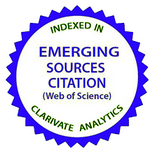Electrical Instability of CdTe:Si Crystals
DOI:
https://doi.org/10.15330/pcss.18.1.29-33Keywords:
cadmium tellurideAbstract
Results of Hall effect measurements of cadmium telluride crystals, doped by silicon (dopant concentration in the melt was 1018 - 1019 cm-3), allowed to classify the studied samples and the conditions under which probably the definite crystal and impurity states are realized. We have found the distinction between 3 type of CdTe:Si crystals: (1) low-resistance p-type crystals with shallow acceptors, in which Si impurity is localized mainly in the large inclusions; (2) semi-insulating crystal with deep acceptors and submicron size dopant precipitates that are source/drain for interstitials Sii - shallow donors; and (3) low-resistance crystals in which the n-type conductivity is provided by shallow donors: Sii (and/or SiCd). Therefore the silicon is responsible for n-type conductivity of doped samples, introducing as a donor Siі and provides semi-insulating state by forming deep acceptor complexes (SiCd-VCd2-)- with (Еv + 0.65 eV). Besides, the submicron silica precipitates, that have a tendto"dissolution" at relatively low temperatures, can act aselectricallyactive centers.
References
[2] A. Martinaitis, O. Panchuk, Sakalas A. et. al., Lithuanian Phys. Coll. (rus.) 2, 178 (1989).
[3] F. A. Selim, V. Swaminathan, F. A. Kroger, Phys. Stat. Sol.(a). 29, 473 (1975).
[4] O. Parfenyuk, M. Ilashchuk, K. Ulyanitsky et. al., Semiconductors 40(2), 143 (2006).
[5] I. N. Odin, M. V. Chukichev, V. A. Ivanov, M. E. Rubina, Inorgan. Mater. 37, 445 (2001).
[6] R. Jasinskaite, A. Martinaitis, A. Sakalas, O. Panchuk, Solid State Commun 58, 681 (1986).
[7] R. Zelinska-Purgal, W. Nazarewicz, Phys. Stat. Sol. (b), 180, 297 (1993).
[8] P. Fochuk, R. Grill, I. Nakonechnyi, O. Kopach, O. Panchuk, Ye. Verzhak, E. Belas, A.E. Bolotnikov, G. Yang and R. James, B. IEEE. Trans. Nucl. Sci. 58(5), 2346 (2011).
[9] M. Sheinkman, A. Schick, Semiconductors 10(2), 209 (1976).
[10] O. Panchuk, A. Savitskiy, P. Fochuk et. al., J. Cryst. Growth 197, 607 (1999).
[11] Z. Zakharuk, S. Dremlyuzhenko, Kovalchuk M. et. al., Phys. Chem. Solid State 8(4), 703(2007).









